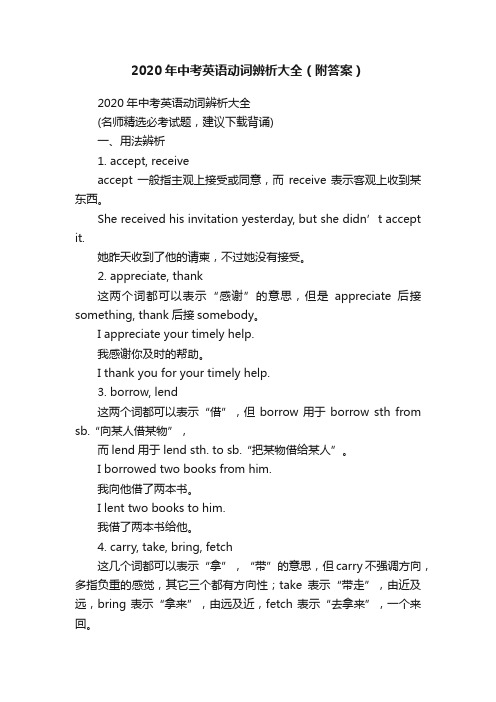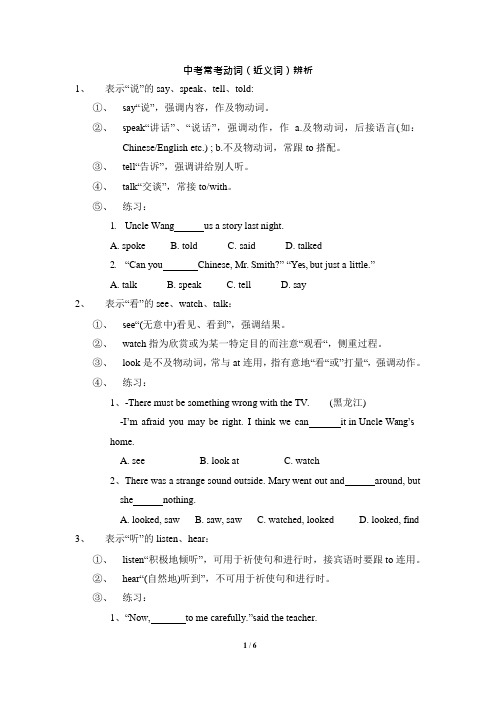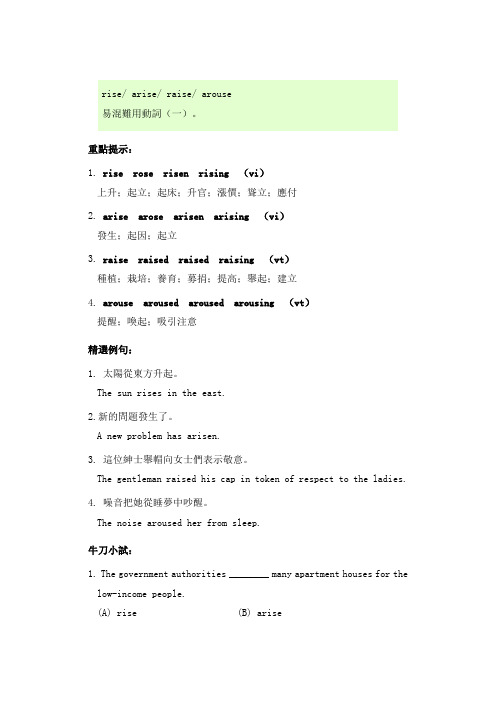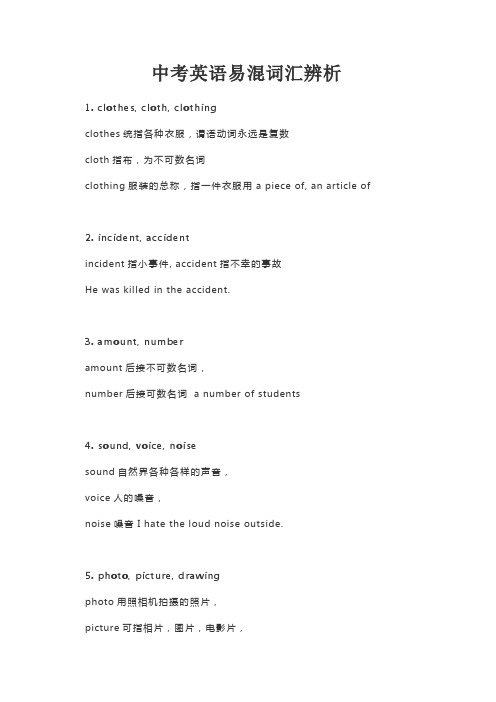中考英语冲刺必记16组易混动词辨析
初中英语易混动词辨析

易混动词及短语动词1.beat和win的区别beat表示“打败”,后面跟的宾语是对手;win表示“赢得”,后面跟比赛或活动等作宾语。
如:They beat the Giants by a score of 7 to 3. 他们以7比3战胜了巨人队。
Though it was not easy, they won the game at last. 虽然不容易,他们最后还是赢了比赛。
2.carry, take与bring的区别take是指将某物或某人从这里“带到”或“拿到”某处。
bring与take相反,是指将某物或某人从别处“带来”或“拿来”。
carry是指随身携带(背着、扛着、提着、抱着),不表明来去的方向。
fetch常指从说话地到另外一个地店,取回某物。
如:Please help me take it to the classroom. 请帮我把它拿到教室去。
May I bring Tom to see you next Monday? 我下周一能带Tom来见你吗?The box is heavy. Can you carry it? 这个盒子太重了,你能拿得起来吗?Fetch a glass of water for me, please. 请给我拿杯水来。
3.cross和across的区别cross与across都表示“穿过;横过"的意思。
但是cross 是及物动词,across是介词,across 是前面必须还要有谓语动词。
如:Is it safe to cross the road now? 现在过马路安全吗?Go across the bridge. You'll find the museum on the left. 走过这座桥,你就会在左边找到那个博物馆。
4.hear与listen to的区别动词hear与listen to之间的区别,同see与look at之间的区别非常相似。
16组易混淆动词辨析

1. used to do sth.;be used to doing sth.和be used to do sth.的区别辨析:used to do sth.表示过去常常做某事.e.g. I used to get up at six in the morning.be used to doing.表示习惯做某事,to 后的动词用-ing 形式e.g. I'm used to getting up early.be used to do sth. 指被用来做什么。
e.g. Pens are used to write.2. arrive, get 和reach的区别辨析:arrive in +大地点,arrive at+小地点,get to+地点名词,reach是及物动词,后面直接跟地点名词。
e.g. When did you arrive in Beijing?We arrived at the village at five in the afternoon。
How do you usually get to school?When she reached the office, the teacher was having a short rest.3. borrow , lend和keep的区别borrow"借",为终止性动词,表示主语"借入"某物,常用短语borrow sth. from sb.lend"借",为终止性动词,表示主语"借出"某物,常用短语lend sth. to sb.keep "保存,借",为持续性动词,表示"长时间地借"e.g. I borrowed a book from the school library yesterday.Could you lend your pen to me?How long can we keep the book?4.dress, put on, 和wear的区别dress sb.给某人穿衣服;dress sb.up打扮某人put on 穿上,戴上,表动作;wear 穿着,戴着,表状态;与"be in"同义e.g. The boy dressed himself quickly.The lady dressed herself up and went to the party.Jim put on his coat and went out.Lily is wearing a red skirt today.5. see, look, watch, readsee 看见,表结果look看,表动作,不及物动词,后面需加介词at才可能跟宾语。
这35组中考常见的易混淆的动词和用法,请收好

这35组中考常见的易混淆的动词和用法,请收好在初中英语中,有一些看起来简单的词汇和固定搭配,却非常容易混淆,导致孩子们常常在考试中丢分,有的孩子甚至从中考到高考到四六级考试,一直在同一个问题上丢分,改变了孩子的命运。
这一篇总结了初中容易混淆的词汇辨析,以及同一个词构成的不同短语辨析,希望孩子们遇到能对照,以后遇到再也不出错不丢分。
(1) seem(好象)的用法记住几个结构:①sb./sth. + seem + (to be+)形容词+…;②sb./sth. + seem + like +…;③sb/sth + seem + to (do);④It seems that+ 从句。
例句:He seemed (to be) very happy when he was called by the headmaster.(被校长叫到名字时他好象很开心)It seems that nobody else could do such a foolish thing except Jim. (除了吉姆好象没有什么人会做出如此愚蠢的事情来) (2)be afraid(害怕)的用法记住几个结构:①be afraid of sth; be afraid of (doing);②be afraid to (do);③be afraid that+从句。
例句:She is a little afraid of snakes.(她有点怕蛇)Don't be so afraid to stay at home alone at night.(别害怕晚上一个人在家)I'm afraid that somebody will take his place because of his serious mistakes.(恐怕有人要取代他了,因为他犯了那么大的错误) (3) be sorry(抱歉)的用法记住几个结构:①be sorry for (sth);②be sorry for (doing sth);③be sorry to (do);④be sorry that+从句。
最全英语动词易混淆词辨析(初)

英语动词易混淆词辨析(初)知识定位纵观近几年全国各地中考英语试题中的单项选择题中的动词类考题,可以分为以下几个大的方面:第一、连系动词、情态动词的用法;第二,动词的时态;第三,动词的语态;第四,动词非谓语形式的用法;第五,近义词的辨析与句义选词。
知识梳理一、连系动词考点例析由于英语连系动词用法灵活,用途广泛,在很多情况下只有连接作用而没有具体的意义,因此,导致很多学生往往无法正确选择合适而又正确的连系动词来构建句子,说出或写出错句。
因此,连系动词成为很多地方中考英语单项选择题中不可缺少的考查点。
二、情态动词考点例析初中英语中在主要的情态动词有can. must, may, needn’t, will, would, shall, should 等。
情态动词的最大特点,在于它的意义灵活性:说话人可根据自己表达意思的需要,选择不同的情态动词来表达自己对某件事发生的可能性或必然性的态度。
我们知道,can 常用来表示能力或请求,用于否定陈述句中则表示否定推测;may 表示请求与许可;must 表示必须做某事,在肯定句中与连系动词be 连用时,表示肯定推测;needn’t 常用于对含must 一般疑问句作否定回答。
情态动词的用法有别于我们汉语的表达方式,因此,考生容易离开考题所设情景,而主观地选择情态动词,从而造成错误。
三、动词时态考点例析中考英语单项选择题中,主要以初中阶段常用的一般现在时、一般过去时、现在完成时、一般将来时、现在进行时和过去进行时作为命题对象,动词时态类考题是各地单项选择题中的重点考查内容,重在考查考生如何识别不同时态的时间状语或如何根据上下文来确定句中动词的时态。
考生主要的错误在于对各种不同动词时态的时间状语掌握不清,以及与时态有关的动词的变化形式容易混淆。
四、动词的语态考点例析对动词语态的考查,主要考查考生能否根据句子表达的需要正确地使用主动语态还是被动语态。
因为英语动词的被动语态主要是由“句子主语+be+动词过去分词”构成。
2020年中考英语动词辨析大全(附答案)

2020年中考英语动词辨析大全(附答案)2020年中考英语动词辨析大全(名师精选必考试题,建议下载背诵)一、用法辨析1. accept, receiveaccept一般指主观上接受或同意,而receive表示客观上收到某东西。
She received his invitation yesterday, but she didn’t accept it.她昨天收到了他的请柬,不过她没有接受。
2. appreciate, thank这两个词都可以表示“感谢”的意思,但是appreciate后接something, thank后接somebody。
I appreciate your timely help.我感谢你及时的帮助。
I thank you for your timely help.3. borrow, lend这两个词都可以表示“借”,但borrow用于borrow sth from sb.“向某人借某物”,而lend用于lend s th. to sb.“把某物借给某人”。
I borrowed two books from him.我向他借了两本书。
I lent two books to him.我借了两本书给他。
4. carry, take, bring, fetch这几个词都可以表示“拿”,“带”的意思,但carry不强调方向,多指负重的感觉,其它三个都有方向性;take表示“带走”,由近及远,bring表示“拿来”,由远及近,fetch表示“去拿来”,一个来回。
He is too young to carry the heavy box.他太小,拿不动这个沉重的箱子。
Don’t forget to take all your things away.不要忘了把你们所有的东西都带走。
Remember to bring your dictionary tomorrow.明天记住把你的词典带来。
中考英语易混动词辨析

中考英语易混动词及短语辨析中考英语中,对易混动词及短语的考查点主要集中在同义词的区别、同形动词短语的区别、具体情景下动词的区别上。
一、同义动词(短语)的区别【例1】 (2009上海市)The room is very dark. I can ’t _______ anything clearly without a light.A. watchB. lookC. seeD. notice【解析】本题考查同义词辨析。
see, look, watch 和notice 这四个动词均有“看”之意,但表达的意义和用法不同。
see 意为“看到”,表示视觉器官有意识或无意识地看到物体,强调看见或没看见什么内容,表示看到的结果,常用作及物动词(一般不用进行时态),后面直接跟宾语。
look 意为“看”,表示有意识地观看,强调“看”的动作,做动词,看静态东西,通常是没有看的目标,是不及物动词,后面不能直接接宾语,做语气词时用于引起某人的注意,单独用的时候表示提醒对方注意。
look 表示“看”时常与at 搭配,表示看的动作和目的,但不一定能看得见或看得清楚,其宾语可以是指人的词语,也可以是指物的词语。
watch 意为“观看;注视”,指以较大的注意力观看,常用作及物动词,有“注视动静”之意,可以直接加宾语,指明是看什么,但不见得看到了什么,多掌握固定搭配。
notice 意为“看到;注意到”,指有意识地注意,含有从不注意到注意的变化的意义。
句意为:屋子太黑,没有灯,我不能清楚地看见东西。
故选C 。
【例2】 (2009年吉林省)I must go now, I have to ________ goodbye to you.A. talkB. tellC. sayD. speak【解析】本题考查词语辨析。
say 意为“说; 讲”,普通用语,指用言语表达思想,强调所说的内容。
speak 意为“说; 讲”,可表示以任何一种方式说话, 它着重于说话这一动作本身。
中考英语复习 中考常考动词(近义词)辨析

中考常考动词(近义词)辨析1、表示“说”的say、speak、tell、told:①、say“说”,强调内容,作及物动词。
②、speak“讲话”、“说话”,强调动作,作 a.及物动词,后接语言(如:Chinese/English etc.) ; b.不及物动词,常跟to 搭配。
③、tell“告诉”,强调讲给别人听。
④、talk“交谈”,常接to/with。
⑤、练习:1.Uncle Wang us a story last night.A. spokeB. toldC. saidD. talked2.“Can you Chinese, Mr. Smith?” “Yes, but just a little.”A. talkB. speakC. tellD. say2、表示“看”的see、watch、talk:①、see“(无意中)看见、看到”,强调结果。
②、watch 指为欣赏或为某一特定目的而注意“观看“,侧重过程。
③、look 是不及物动词,常与at 连用,指有意地“看“或”打量“,强调动作。
④、练习:1、-There must be something wrong with the TV. (黑龙江)-I’m afraid you may be right. I think we can it in Uncle Wang’shome.A. seeB. look atC. watch2、There was a strange sound outside. Mary went out and around, butshe nothing.A. looked, sawB. saw, sawC. watched, lookedD. looked, find3、表示“听”的listen、hear:①、listen“积极地倾听”,可用于祈使句和进行时,接宾语时要跟to 连用。
②、hear“(自然地)听到”,不可用于祈使句和进行时。
易混动词(短语)辨析(8份)

一、易混动词(短语)辨析。
1. used to do, be used to doing, be used to doused to do sth表示“过去常常做某事”。
be used to doing sth表示“习惯于做某事”。
be used to do sth表示“被用来做某事”。
2. arrive, get, reacharrive in+大地点;arrive at+小地点。
get to+地点名词。
reach是及物动词,后面直接跟地点名词。
3. borrow, lend, keepborrow“借”,终止性动词,表示主语“借入”某物,常用短语borrow sth from sb。
lend“借”,终止性动词,表示主语“借出”某物,常用短语lend sth to sb。
keep“保存,借”,延续性动词,表示“长时间地保存”。
4. dress, put on, wear, be in, have ondress +人,表动作。
put on+衣服,表动作。
wear+衣服/首饰,表状态。
have on+衣服,表状态。
be in+衣服/颜色,表状态。
5. see, look, watch, readsee“看见”,表结果。
watch “看(比赛,电视)”,表动作, 及物动词。
read “阅读(书籍,报刊)”,表动作。
look“看”,表动作;不及物动词,后面须加介词才能跟宾语。
6. bring, take, carry, fetchbring“带来,拿来”,表示拿到靠近说话者的地方。
take“带走,拿去”,表示拿到远离说话者的地方。
carry“扛,搬”,用力移动,没有方向性。
fetch“去取,去拿”,表示往返取物。
7. join, take part in, attend 三个词都有“参加”的意思。
join一般指加入党派或组织,如参军,入党等。
take part in 指参加聚会或活动。
attend一般指出席会议。
易混动词辨析(初中英语专题复习)

易混动词辨析(初中英语专题复习)【易混辨析】【图解助记】cost /pay/ take /spend的区别:cost 的主语通常是事或物(包括形式主语it),不能是人;pay 的主语只能是人,常与for连用;spend 的主语也只能是人,构成spend on sth.或spend in doing sth.;take的主语常常是形式主语it。
如:The computer cost (me) $2000. 这台电脑花了(我) 2000 美元。
I have spent all day looking for you. 我花了一整天来找你。
It took him an hour to write the letter. 他写这封信花了一个小时。
She paid 10 yuan for this book. 她买这本书花了10元钱。
1.keep作及物动词,意为"使……保持(某种状态)"、"使得……"时,常用于以下几种结构:(1)keep+宾语(由人或物充当)+形容词。
Keep your hands clean. 手要保持干净。
(2)keep+宾语+副词。
What have kept you awa for so long? 什么事使你离开这么久?(3)keep+宾语+v-ing。
I’m sorry to have kept you waiting. 对不起,让你久等了。
(4)keep+宾语+v-ed。
Keep the door clsed. 让门关着。
(5)keep+宾语+介词短语。
Don’t keep your hands in your pockets. 不要把手插在口袋里。
2.keep作及物动词,后接名词作宾语,构成动宾结构,意为"保存"、"保留"、"记(日记等)"、"经营(商店等)"、"遵守(诺言等)"之意。
I keep a diary in English.我用英文记日记。
She keeps a bllkstore.她经营一家书店。
中考易混用动词辨析

rise/ arise/ raise/ arouse易混難用動詞(一)。
重點提示:1. rise rose risen rising (vi)上升;起立;起床;升官;漲價;聳立;應付2. arise arose arisen arising (vi)發生;起因;起立3. raise raised raised raising (vt)種植;栽培;養育;募捐;提高;舉起;建立4. arouse aroused aroused arousing (vt)提醒;喚起;吸引注意精選例句:1. 太陽從東方升起。
The sun rises in the east.2.新的問題發生了。
A new problem has arisen.3. 這位紳士舉帽向女士們表示敬意。
The gentleman raised his cap in token of respect to the ladies.4. 噪音把她從睡夢中吵醒。
The noise aroused her from sleep.牛刀小試:1. The government authorities ________ many apartment houses for the low-income people.(A) rise (B) arise(C) raise (D) arouse2. The accident on the freeway ________ from careless driving.(A) rose (B) arose(C) raised (D) aroused3. Her pretty attire ________ all the boys.(A) rose (B) arose(C) raised (D) aroused4. The children ________ from their seats to salute the national flag.(A) rose (B) arisen(C) raised (D) aroused5. My suspicion ________ owing to his refusing to tell me the truth.(A) rose (B) arose(C) raised (D) arousedlie /lay易混難用動詞(二)。
中考英语冲刺必记16组易混动词辨析

中考英语冲刺必记16组易混动词辨析 中考英语冲刺必记16组易混动词辨析1. used to do sth.;be used to be used to do sth.的区别辨析:used to do sth.表示过去常 e.g. I used to get up at six in be used to doing.表示习惯做某事词用-ing 形式e.g. I'm used to getting up ea be used to do sth. 指被用来做什 e.g. Pens are used to write.2. arrive, get 和reach 的区别 辨析:arrive in +大地点,arriv get to+地点名词,reach 是及物动词,点名词。
e.g. When did you arrive in Be We arrived at the village at f afternoon 。
How do you usually get to scho When she reached the office, th having a short rest.3. borrow , lend 和keep 的区别 borrow"借",为终止性动词,表示物,常用短语borrow sth. from sb. lend"借",为终止性动词,表示主常用短语lend sth. to sb.keep "保存,借",为持续性动词,地借"e.g. I borrowed a book from the s yesterday.Could you lend your pen to me? How long can we keep the book?4.dress, put on, 和wear 的区别 dress sb.给某人穿衣服;dress sb put on 穿上,戴上,表动作; wear 穿着,戴着,表状态;与"be e.g. The boy dressed himself q The lady dressed herself up an party.Jim put on his coat and went o Lily is wearing a red skirt to5. see, look, watch, readsee 看见,表结果look看,表动作,不及物动词,后才可能跟宾语。
中考20组必考英语易混词辨析

初中必考20组必考英语易混词辨析——易混词辨析——1、accomplish vs. achieveaccomplish (v.): 完成某项任务。
例子: She accomplished her homework. (她完成了作业。
)achieve (v.): 实现目标。
例子: He achieved his goal. (他实现了他的目标。
)2、advice vs. adviseadvice (n.): 建议。
例子: I need your advice. (我需要你的建议。
)advise (v.): 提供建议。
例子: I advise you to study. (我建议你学习。
)3、allow vs. permitallow (v.): 允许,通常口语化。
例子: My parents allow me to go out. (我的父母允许我出去。
)permit (v.): 允许,通常正式。
例子: The school permits it. (学校允许这样做。
)4、bored vs. boringbored (adj.): 感到无聊的。
例子: I feel bored in class. (我在课堂上感到无聊。
)boring (adj.): 令人无聊的。
例子: The movie was boring. (这部电影很无聊。
)5、careful vs. cautiouscareful (adj.): 小心的。
例子: Be careful with that glass. (小心那只玻璃杯。
)cautious(adj.): 小心翼翼的,避免风险。
例子: He is cautious with money. (他在处理钱时很小心。
)6、common vs. ordinarycommon (adj.): 普遍的。
例子: It is common to use phones. (使用手机是很常见的。
中考英语复习:易混动词辨析及动词短语归纳

中考英语复习易混动词辨析及动词短语归纳1. take、bring 与carry 的区别take 指将某物或某人从这里“带到”或“拿到”某处。
如:Could you take it to the classroom?你能把它带到教室吗?bring 与take 相反,指将某物或某人从别处“带来”或“拿来”。
如:May I bring Tom to see you next Monday?下周一我可以带汤姆来见你吗?carry 指随身携带(背着、扛着、提着、抱着),不表明来去的方向。
如:The box is heavy . Can you carry it?盒子太重了。
你搬得动吗?2. find 、look for 与find out 的区别find 的意思是“找到”,look for 是“寻找”,find out 是经过调查“发现、查明(真相)”。
如:I can’t find my pen . 我找不到我的钢笔了。
He is looking for his cat . 他正在寻找他的猫。
Can you find out who broke the window?你能查明是谁打破了窗户吗?3. forget 与leave 的区别这两个词都有“忘”的意思,其区别如下:forget 常表示“记不起”“忘了要带(买)”,leave 表示“把某物忘(丢)在某地”。
如:I forget his name . 我忘记他的名字了。
He left his gloves on the train . 他把他的手套忘在火车上了。
4. hear 与listen to 的区别hear 与listen to 都有“听”的意思,其区别如下:hear 常表示“听见;听到”,listen to 常表示“倾听(集中注意力去听)”。
易混动词辨析8. speak、say、talk与tell的区别speak、say和talk都含有“说、讲、说话”的意思。
中考英语易混词汇辨析

中考英语易混词汇辨析1. clothes, cloth, clothingclothes统指各种衣服,谓语动词永远是复数cloth指布,为不可数名词clothing服装的总称,指一件衣服用a piece of, an article of2. incident, accidentincident指小事件, accident指不幸的事故He was killed in the accident.3. amount, numberamount后接不可数名词,number后接可数名词 a number of students4. sound, voice, noisesound自然界各种各样的声音,voice人的嗓音,noise噪音I hate the loud noise outside.5. photo, picture, drawingphoto用照相机拍摄的照片,picture可指相片,图片,电影片,drawing画的画Let's go and see a good picture.6. weather, climateweather一天内具体的天气状况,climate长期的气候状况The climate here is not good for you.7. road, street, path, wayroad具体的公路,马路,street街道,path小路,小径,way道路,途径take this road; in the street, show me the way to the museum.8. course, subjectcourse课程(可包括多门科目),subject科目(具体的学科)a summer course9. custom, habitcustom传统风俗,习俗,也可指生活习惯,后接to do,habit生活习惯,习惯成自然,后接of doing.I've got the habit of drinking a lot.10. cause, reasoncause指造成某一事实或现象的直接原因,后接of sth./doing sth,reason用来解释某种现象或结果的理由,后接for sth./doing sth. the reason for being late11. exercise, exercises, practiceexercise运动,锻炼(不可数),exercises练习(可数),practice(反复做的)练习Practice makes perfect.12. class, lesson作"课"解时,两者可以替换.指课文用lesson.指班级或全体学生用class. lesson 6; class 513. speech, talk, lecturespeech指在公共场所所做的经过准备的较正式的演说,talk日常生活中的一般的谈话,讲话,lecture学术性的演讲,讲课 a series of lecture on…14. work, job二者均指工作。
初中英语中考复习动词辨析和动词短语汇总

中考英语动词辨析和动词短语一、近义动词词义辨析三个“借”borrow 非延续性动词,表示主语“借入”,常用搭配borrow sth. from sb.lend 非延续性动词,表示主语“借出”,常用搭配lend sth. to sb.或lend sb. sth.keep 延续性动词,表示“长时间地借”三个“到达”get get to+地点名词reach及物动词,后面可直接跟地点名词reach 及物动词,后面可直接跟地点名词arrive in+大地点(名词)at+小地点(名词)三个“穿”dress dress sb. 给某人穿衣服 dress sb. up 打扮某人put on 穿上,戴上,表示动作wear 穿着,戴着,表示状态四个“花费”spend 人作主语,表示花费时间或金钱,后接on sth. 或(in) doing sth.cost 物作主语,表示“某物花费多少钱”take 可用于固定句型,表示“花费一段时间做某事”,其结构为:It+takes/took+一段时间+to do sth.pay 常与介词for连用,表示“支付”四个“看”see “看见”,表示结果look “看”,表示动作,是不及物动词,后面需加介词at才能跟宾语watch “观看(比赛、电视等)”read “看(书、报等)”,表示阅读四个“说”speak 作及物动词时后接表示语言的名词,表示“说,讲述”say 常跟直接引语或间接引语,表示说的内容talk 是不及物动词,常跟介词to和with,意为“同……谈话”,也表示具有说话能力tell 意为“告诉”,与story连用,意为“讲故事”四个“拿”bring “带来,拿来”,表示拿到靠近说话人的地方take “拿去,带走”,表示拿到远离说话人的地方carry “扛,搬,用力移动”,没有方向fetch “去取,去拿”,表示往返拿东西四个“赢,输”lose 意为“输给”某人,固定搭配为lose to sb.fail 意为“失败”或“未做成某事”beat 意为“打败”,后接人或某支队伍win 意为“赢得,荣誉,地位,比赛等”四个“参加”join 一般指加入“党派”或“组织”并成为其中一员,如参军,入党,入团等join in 指参加竞赛、娱乐、游戏等活动take part in 指参加聚会或群众性活动attend 一般指出席会议、典礼、婚礼等四个“变化”turn 一般用于颜色的变化get 天变黑、变长或变短become 天气变暖或变冷等,表示渐变grow 形状变大或变小二、感官动词词义辨析sound 意为“听起来……”指听觉。
初中重点难点易混动词(短语)讲解

易混动词(短语)辨析1.be used to doing sth. 和used to do sth. 的区别be used to doing sth. 表示习惯做某事I am used to getting up early.(我习惯早起)used to do sth. 过去常常做某事,表示过去的习惯或状态,现在已经不做了He used to play football every Sunday.(过去他每个星期天都踢足球。
)2.borrow,lend和keep的区别Borrow表借入,常与from搭配。
borrow sth. from sb. ;I borrowed a book from the library yesterday.(昨天我从图书馆借了一本书。
)lend“借出”,常用lend sth. to sb.;Can you lend your pen to me?(你能把你的笔借给我吗?)keep表长时间地借。
How long can we keep the book?(我们能借这本书多久? )3. dress , put on , wear的区别dress sb.给某人穿衣服;dress sb.up打扮某人;Mother dressed her baby in a red skirt.(母亲给婴儿穿上红裙子。
)The lady dressed herself up and went to the party.(这位女士穿上盛装去参加聚会了。
)put on穿上, 戴上,表动作;Jim put on his coat and went out.(吉姆穿上大衣出去了。
)wear穿着,戴着,表状态。
Lily is wearing a red skirt today.(莉莉今天穿着一条红裙子。
)4. see , look , watch 和read的区别see 侧重看见,强调看的结果;I can see a bird in the tree.(我看见树上有只鸟。
- 1、下载文档前请自行甄别文档内容的完整性,平台不提供额外的编辑、内容补充、找答案等附加服务。
- 2、"仅部分预览"的文档,不可在线预览部分如存在完整性等问题,可反馈申请退款(可完整预览的文档不适用该条件!)。
- 3、如文档侵犯您的权益,请联系客服反馈,我们会尽快为您处理(人工客服工作时间:9:00-18:30)。
中考英语冲刺必记16组易混动词辨析
1. used to do sth.;be used to doing sth.和be used to do sth.的区别
辨析:used to do sth.表示过去常常做某事.
e.g. I used to get up at six in the morning.
be used to doing.表示习惯做某事,to 后的动词用-ing形式
e.g. I'm used to getting up early.
be used to do sth. 指被用来做什么。
e.g. Pens are used to write.
2. arrive, get 和reach的区别
辨析:arrive in 大地点,arrive at 小地点,get to 地点名词,reach是及物动词,后面直接跟地点名词。
e.g. When did you arrive in Beijing?
We arrived at the village at five in the afternoon。
How do you usually get to school?
When she reached the office, the teacher was having a short rest.
3. borrow , lend和keep的区别
borrow"借",为终止性动词,表示主语"借入"某物,常用短语borrow sth. from sb. lend"借",为终止性动词,表示主语"借出"某物,常用短语lend sth. to sb.
keep "保存,借",为持续性动词,表示"长时间地借"
e.g. I borrowed a book from the school library yesterday.
Could you lend your pen to me?
How long can we keep the book?
4.dress, put on, 和wear的区别
dress sb.给某人穿衣服;dress sb.up打扮某人
put on 穿上,戴上,表动作;
wear 穿着,戴着,表状态;与"be in"同义
e.g. The boy dressed himself quickly.
The lady dressed herself up and went to the party.
Jim put on his coat and went out.
Lily is wearing a red skirt today.
5. see, look, watch, read
see 看见,表结果
look看,表动作,不及物动词,后面需加介词at才可能跟宾语。
watch 看(比赛,电视)
read 看书,报,表示阅读
e.g. I can see an apple on the table.
Look, there is a kite flying in the sky.
Watching TV too much is bad for your health.
Don't read books in the sun.
6.bring, take, carry, fetch
bring意为"拿来,带来",表示"拿到靠说话人近的地方"
take意为"拿走,带走",表示"拿到远离说话人远的地方"
carry 意为"扛,搬",用力移动,没有方向性,
fetch 意为"去取,去拿"表示往返拿物。
e.g. Please take the books to the classroom.
Remember to bring your home work to school tomorrow.
The bag is very heavy, please carry it to my office.
She's gone to fetch the kids from school.
7.die, dead, death,和dying的区别
Die 意为"死",是不及物动词,非延续性动词;
Dead 意为"死的",是形容词,表状态;
Death 意为"死",是名词;
Dying意为"垂死的,要死的",是形容词。
e.g. Her grandfather died last year.
Her grandfather has been dead for two years.
His death was a great loss to China.
The poor old man was dying.
8.speak, say, talk 和tell 的区别
speak 作为及物动词表示语言的名词或只在会议上发言;
say 常跟直接引语或间接引语,并且表示说的内容;
talk 是不及物动词,常跟介词to 或with,意为"同某人谈话",也表示具有说话的能力
tell 意为"告诉"并常与story连用,意为"讲故事"
9.spend,take,pay,cost
Spend 只花费时间或金钱,后接on sth.或(in)doing sth.;
Cost 物做主语,意为"值多少钱"
Take 可用固定句型表示花费时间、金钱,其结构为:It takes 时间/金钱to do sth, Pay 与介词for 连用
10.Look for,find
两个词都有找的意思。
Look for强调寻找的过程,find强调寻找的结果。
11.Listen to,hear
Listen to 和hear都有"听"的意思。
Listen为不及物动词,与to构成固定搭配,强调听的动作;hear 强调听的结果。
12. hung, hanged
两个词同为hang过去分词,hung意为"悬挂",而hanged意为"绞死"。
13. lose,fail,beat,win
Lose"输给某人"lose to sb
Fail "失败"
Beat"打败"beat sb.或某支队伍
Win "赢得",如何赢得荣誉,比赛,地位等。
14.Lose,forget,leave
Lose意为"丢失,失去"
Forget"忘记"后可跟不定式和动名词
Leave sth. 地点"把某物落在某处"
15. think of, think about, think over
Think of "想到…"
Think about "考虑"宾语it或them置后
Think over "仔细考虑",宾语it或them放在中间,一般指考虑问题。
16.Join,take part in,attend
三个词都表示"参加"
Join 一般指加入"党派"或组织, 如参军,入党等
Take part in 只参加聚会活动;Attend 一般指出席会议。
